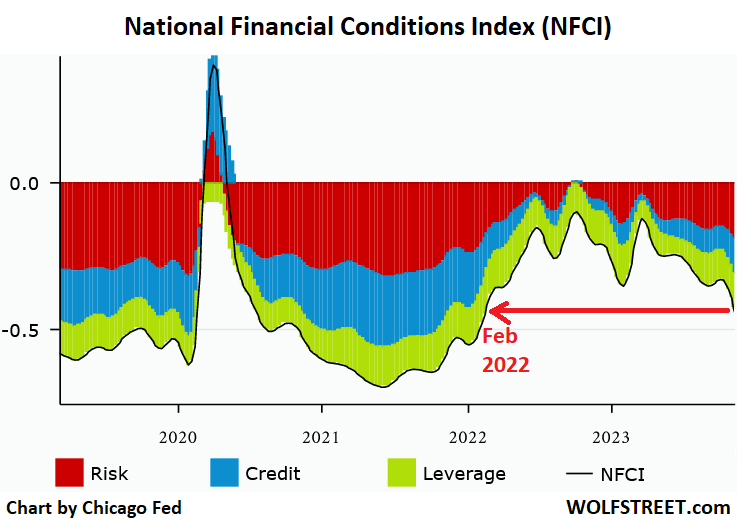November 23, 2023 | Even Higher for Longer if Markets Keep Fighting Central Banks, ECB’s Wunsch Explains. The Fed Has Same Problem

Rate-cut bets have been piling up and getting moved closer, as everything that central bankers say – no matter what – is either being interpreted as “dovish” or is being brushed aside. The “Powell-was-dovish” mantra has been getting spread across the internet after every FOMC press conference since June 2022. In early 2022, just as the Fed had started hiking, rate cuts for later in 2022 were already being bet on. Then came the bets for rate cuts in 2023, and now there’s only one meeting left, and still no rate cuts. So the heavy breathing about rate cuts has shifted to 2024, and the cuts are getting bigger and closer.
Meanwhile, central bankers at the Federal Reserve, at the Bank of Canada, at the ECB, at the Bank of England, at the Reserve Bank of Australia, etc. have been flagellating their arms to tamp down on these rate-cut bets.
The Reserve Bank of Australia finally has had it and hiked by 25 basis points in November after a long pause.
There is a problem with markets betting against central banks. Central banks are “tightening” in order to tighten financial conditions in the markets – including higher long-term yields and wider spreads between government debt and risky debt, such as junk bonds, etc.
So ECB Governing Council member Pierre Wunsch came out and made it explicit – not that anyone in the markets listened: These rate-cut bets could actually trigger the opposite: a rate hike.
“Is it a problem if everybody believes we’re going to cut?” Wunsch said in an interview with Bloomberg. “Then we have a less restrictive monetary policy. And I’m not sure that then it’s going to be restrictive enough. So it increases the risk that you have to correct in the other direction.”
“I think markets are relatively optimistic today that they exclude the possibility that we have to do more or that we have to remain at 4% for longer,” said Wunsch.
“If we arrive at the conclusion that inflation is not going down fast enough, we’ll communicate it through our projection and through our communication,” he said.
“If the markets don’t infer from this that it’ll be high for longer, then we’ll have to use our rate instruments and hike to get where we want to go.”
Which is what the Reserve Bank of Australia did earlier in November when it hiked by 25 basis points.
Wunsch doesn’t see any rate hikes at the next two ECB policy meetings thanks to “recent marginal positive surprises on inflation.”
“That moves the question to the next uncertainty: Are we going to see some inflation resistance at some point at 3% or something like that because of wages?” he said. “That is something we’re not going to know by December or January.”
It’s almost funny how markets have been betting against central banks ever since they started tightening. But recently, those bets have turned into a raging party, and as a result financial conditions have loosened a lot, instead of tightening.
In the US, there are various measures that track financial conditions. For example, the Chicago Fed’s weekly National Financial Conditions Index (NFCI) is based on 105 measures of financial activity to track conditions in money markets, debt markets, equity markets, the banking system, and the “shadow” banking system (what goes into it is explained here). For the week ending November 17, the index showed further loosening, with the index value falling to -0.47, the lowest since February 2022, before the Fed even started hiking.
The Fed, the ECB, the BOC, the RBA, and the BOE have been facing the same issue: markets are not cooperating – markets are fighting them, financial conditions have gotten looser and thereby provide additional fuel for inflation, and the longer markets are doing this, the more they’re risking that rates will end up even higher for longer. The Chicago Fed’s NFCI:

STAY INFORMED! Receive our Weekly Recap of thought provoking articles, podcasts, and radio delivered to your inbox for FREE! Sign up here for the HoweStreet.com Weekly Recap.
Wolf Richter November 23rd, 2023
Posted In: Wolf Street











